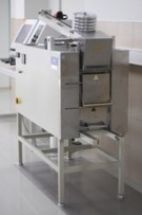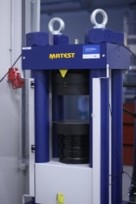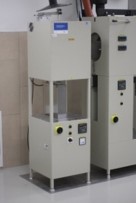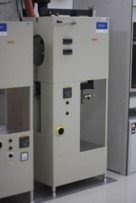
Building materials based on silicates
Silicate materials find applications in many industries. They are used for example in the construction industry (concrete, cement, lime), the ceramics and glass industries (from classic cups and glasses to special applications such as catalyst supports or special filters), in paint industries (binders and fillers), fireproof and refractory applications (the lining of domestic fireplaces to large foundry and glass furnaces) or in the restoration of artworks.Our group is focused on a number of projects in the field of silicates. We offer to our customers except the classic tests of materials also consulting and an expert services.
Research group of building materials based on silicates carries out sample testing of construction materials to withstand high temperatures, pressures and aggressive environment.
For testing of building materials we have a top-class laboratory equipment and qualified professionals in the properties of silicate building materials.
|
Tests at elevated and high temperatures |
Mechanical tests |
||
 |
Combined furnace
Standards: ČSN EN – 993-6, ČSN EN – 993-7 Use: Determination of flexural strength, E-modulus determination by static method in bending and creep bending at temperatures of 25-1550 ° C. Max sample size: 25x25x160mm |
 |
Equipment for determining the bending strength and pressure MATEST C089 SERIE
Standards: ČSN EN 1015-11, ČSN EN 772-6, ČSN EN 1170-4, ČSN EN 993-6, ČSN EN 843-1, ČSN EN 658-3 Use: Determination of compressive? strength (0-3000kN) and bending (0-15kN). Determination of Young's modulus by the static method (pressure). Max sample size: pressure: cube sizes up to 200 mm cylinder size up to d = 160mm, h = 320 mm |
 |
Furnace for determination of corrosion resistance refractory material by a melts
Standards: ČSN P CEN/TS 15418 Use: Determination of the corrosion resistance of refractories by a melt at temperatures of 25- 1650 ° C. |
 |
Equipment for determining the bending strength and pressure MATEST E183N
Standards: ČSN EN 1015-11, ČSN EN 12808-3, ČSN EN 993-6 Use: Determination of compressive strength (0-250 kN) Max sample size: Pressure: S1 = 10-100 mm, W2 = 10 to 100 mm, |
 |
Furnace for determination of load capacity in heat and creep in pressure Standards: ČSN EN 993-8 Use: Determination of strength in the heat and creep under pressure Max sample size: d1 = 50mm, d2 = 12mm, h = 50mm |
Instrumentation
|
Device name |
Details |
|
Combined furnace for determining - bending strength at high temperature, - E - module static method at high temperature, - creep bending at high temperatures |
Max. temperature 1550°C Max sample size 150x25x25mm, load up to 2500N, deflection accuracy 4µm/1mm ČSN EN – 993-6, ČSN EN – 993-7 |
|
Furnace for determination of corrosion resistance refractory material by a melts |
Max. temperature 1700°C, operating temperature 1650°C, 0-20 rpm, ČSN P CEN/TS 15418 |
|
Furnace for determination of load capacity in heat and creep in pressure |
Max. temperature 1650°C, accuracy 4µm/1mm, load up to 0,2MPa (3 ranges) ČSN EN 993-8 |
|
Vicat automatic recording device |
Determining the setting time of putty, EN-UNI 196-3, DIN 1168 SADRA, ASTM C 191 |
|
Le-Chatelier water bath |
EN196-3 |
|
Moisture analyzer |
|
|
Laboratory oven VENTICELL |
Tempering of materials with hot air forced by the fan. Designed for temperatures up to 250 ° C. |
|
Drying MEMMERT UF75 with forced air |
Max. temparature 300°C, interior width [mm] 400, interior high [mm] 560 |
|
Automatic laboratory mixer of mortal mixtures |
EN 196-1 |
|
Electro-hydraulic testing machine with a drive unit |
Determination of compressive strength (0-3000kN), flexural strength, modulus of elasticity ČSN EN 1015-11, ČSN EN 772-6, ČSN EN 1170-4, ČSN EN 993-6, ČSN EN 843-1, ČSN EN 658-3 |
|
Electro-hydraulic testing machine with microprocessor unit cyber-plus evolution |
Determination of compressive strength (0-250 kN) and the bending (0-15kN), measuring the modulus of elasticity ČSN EN 1015-11, ČSN EN 993-6 |
|
Laboratory mixer of concrete mixtures LMB - C1 CYCLOS |
Preparation of concrete mixtures and mortars in a volume to 70 liters. The speed of the blades 48 rpm |
|
Vibration high frequency table VSB-70 REM |
Zhutňování betonových směsí běžného i vozovkového betonu Compacting concrete mixtures of ordinary and roadway concrete. Speed 2 000-10 000 rpm. |
|
Autoclave |
V = 8l, Tmax = 300°C, pmax = 40bar |
|
Large capacity cabinet for wet storing |
Storing large quantities of cement and mortar samples at saturated humidity and regulated temperature. |
|
Diamond saw |
There is even a blade for cutting metal samples |
|
Equipment for measuring fluidity test |
ČSN EN ISO 4534 |
|
Furnace |
Max. temperature 1200°C, diameterr x high = 170x230 mm |
|
Climatic chamber |
Temperature = -25 to +70°C |
|
Water bath (Matest C304-02) |
Capacity = 200l, EN 196-8 EN ISO 679 ASTM C511 ASTM C109 EN 196-1 |
CARRYING OUT THE TEST
|
FIELDS OF ACTION
|
Assessment of the properties of materials under extreme conditions allows better understand the properties of materials, to determine their real life and in non-standard situations and avoid accidents buildings in crisis situations - fires or earthquakes.
Contact:
Department of silicate building materials
Technopark Kralupy of The University of Chemistry and Technology, Prague
Dr. Ing. Petr Antoš, Ph.D.
antosp@vscht.cz
Tel. +420 22044 6110, +420 22044 6130
Ing. Jan Urbánek
urbanekj@vscht.cz
Tel. +420 22044 6121, +420 22044 4149


